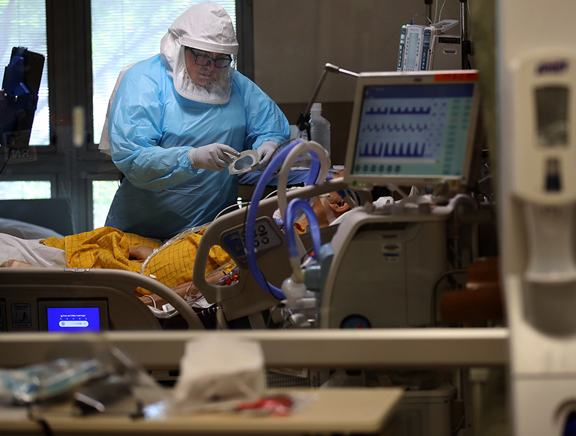intensive critical unit

Intensive Care Unit
The intensive care Unit is for the highest level of patient care for critically ill patients recovering from a life-threatening illness, chronic organ failure, or life-threatening deterioration of a patient's condition. The capacity temporarily supports or replaces the function of failing organs like kidneys, heart or lungs
The Intensive Care Unit (ICU) is a separate, self-contained area equipped with high-tech specialized facilities and a specialized team of doctors and nurses for close monitoring and intervention for patients in life-threatening situations. The aim is to prevent further physiological deterioration and maintain the vital functions of critically ill patients.
Types of Intensive Care Units (ICUs)Intensive care units can be separated based on pathological conditions and treatment the patient is undergoing, such as neurological, trauma, burns, etc. By the age group into paediatrics and neonatal. ICUs are medical, surgical, paediatric and neonatal intensive care units.
Icu Equipment
ICUs at LifeCare Hospitals have high-tech life support equipment which includes but is not limited to:- Cardiac monitors
- Ventilators
- Infusion pumps
- Syringe pumps
- Suction pumps
- Oxygen
- Respiratory support machines like BiPAP and CPAP

Who gets admitted to ICU?
The intensive care unit is an expensive resource. It is reserved for a limited number of patients who are in life-threatening situations. Doctors carefully evaluate the patients before referring them to the ICU. Two patient categories are not to benefit from ICU care. These are described as being "too well to benefit" and "too sick to benefit" from critical care services. Admissions to ICU depend on the severity of the illness, chronic health and physiology reserve, therapeutic susceptibility and being informed by the wishes of patients or caregivers.
Many factors contribute to admission into ICU.
- Characteristics of the ICU, availability of beds, equipment and expertise of the nursing staff.
- Patient factors include preferences, functional capacity, age, illness characteristics concerning severity, reversibility, responsiveness to therapy and quality of life after discharge.
- Physician factors like his experience, personality, and biases
Admission to ICUs depends on multiple factors. The intensive care units at LifeCare Hospitals have the best team of nurses and doctors committed to saving lives. Our doctors thoroughly evaluate a patient's health, age and other physiological factors for our patient's well-being and quality care.
FAQs
Do you have any Questions? We are here!

An ICU is a specialized hospital unit that provides intensive care to critically ill or injured patients who require constant medical monitoring and life support.
Patients who are critically ill or require close monitoring and intensive medical care, such as those with severe respiratory distress, cardiac arrest, septic shock, or major trauma, may require admission to an ICU.
The length of stay in the ICU varies depending on the severity of the patient's condition and the nature of their illness or injury. Some patients may stay in the ICU for only a few days, while others may require prolonged stays of several weeks or even months
Why choose us?
Safe Care: Delivering health care which minimizes risks and harm to service users.
Reliable Care: Ability to successfully provide safe and person-centered care repeatedly. That we are effective, efficient and accessible/timely.
Patient Experience: Patients are an integral part of experiencing quality and safety related processes and are the ultimate recipients of care and judges of quality. That we are equitable and patient-centered in service delivery.
